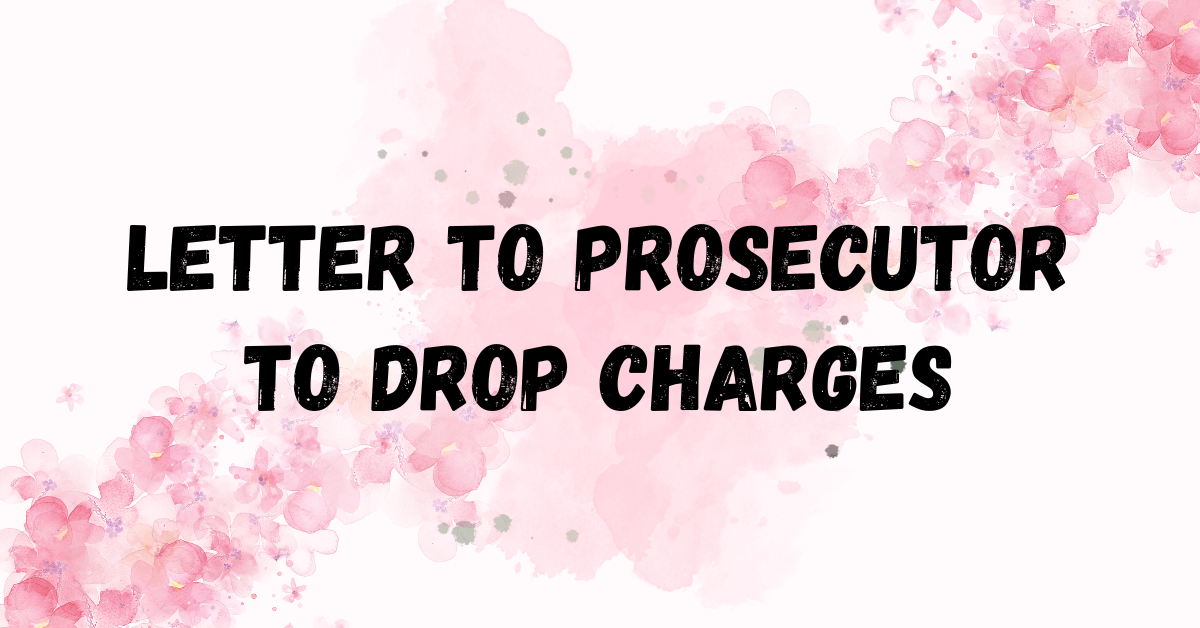Are you facing criminal charges you believe should be dropped? A Letter to Prosecutor to Drop Charges can be a powerful tool. This letter is a formal request to the prosecutor handling your case, urging them to dismiss the charges against you. Its purpose is straightforward: to present your case in a compelling manner and convince the prosecutor that dropping the charges is in the best interest of justice.
In this article, we’ve got you covered with templates, examples, and samples of Letter to Prosecutor to Drop Charges. Whether you’re unfamiliar with legal jargon or unsure how to structure your argument, we provide easy-to-follow guides to help you draft a persuasive letter. These resources aim to simplify the process, empowering you to advocate for yourself effectively.
With our collection of Letter to Prosecutor to Drop Charges samples, writing your letter becomes a breeze. From outlining the reasons for dismissal to emphasizing mitigating factors, we offer diverse templates to suit your specific situation. Take the guesswork out of crafting your plea and ensure your voice is heard with our practical guidance.

Sample of a Letter to Prosecutor to Drop Charges
[Your Name]
[Your Address]
[City, State, Zip Code]
[Email Address]
[Phone Number]
[Date]
[Prosecutor’s Name]
[Prosecutor’s Office]
[City, State, Zip Code]
Dear [Prosecutor’s Name],
I am writing this letter to request the dropping of charges against me in case number [Case Number]. I believe that dropping the charges is in the best interest of justice for the following reasons.
Firstly, the incident in question was a misunderstanding that arose due to a lack of communication. It was not my intention to cause any harm or break any laws. I deeply regret my actions and have taken steps to ensure that such a situation does not occur again.
Secondly, I have no prior criminal record and have always been a law-abiding citizen. The consequences of a conviction would be severe for me and my family. It would not only tarnish my reputation but also have a detrimental impact on my career and future prospects.
In conclusion, I respectfully request that you drop the charges against me. I assure you that I have learned from this experience and will do everything in my power to make amends and prevent similar incidents in the future.
Thank you for your time and consideration.
Sincerely,
[Your Name]
How to Write a Letter to Prosecutor to Drop Charges
Writing a letter to a prosecutor to drop charges can be a complex and sensitive task. It requires careful consideration of legal aspects and persuasive communication skills. In this guide, we will walk you through the process of writing a compelling letter to the prosecutor, urging them to drop the charges against you.
1. Understanding the Purpose of the Letter
Before you start writing, it’s crucial to understand the purpose of your letter. The goal is to persuade the prosecutor that dropping the charges is in the best interest of justice. You need to present your case clearly and convincingly, highlighting any mitigating factors or reasons why the charges should be dropped.
2. Gathering Relevant Information
To write an effective letter, you’ll need to gather all relevant information related to your case. This includes details of the incident, any evidence or witnesses that support your case, and any legal precedents or statutes that support your argument. The more information you have, the stronger your case will be.
3. Structuring Your Letter
Start your letter by addressing the prosecutor respectfully and clearly stating the purpose of your letter. In the body of the letter, outline the reasons why you believe the charges should be dropped. Use clear and concise language, and provide any supporting evidence or arguments to strengthen your case.
4. Presenting Your Argument
In this section, you’ll need to present your argument in a logical and persuasive manner. Use facts, statistics, and expert opinions to support your case. Avoid emotional language and stick to the facts. Remember, your goal is to persuade the prosecutor based on the merits of your case.
5. Addressing Counterarguments
Anticipate any counterarguments the prosecutor may have and address them in your letter. This shows that you have considered all aspects of the case and strengthens your argument. Be respectful and objective in your response to counterarguments.
6. Closing Your Letter
In the closing paragraph, reiterate your request for the charges to be dropped and thank the prosecutor for considering your request. Provide your contact information in case they need to follow up with you.
7. Reviewing and Editing
Before sending your letter, make sure to review and edit it carefully. Check for any grammatical errors or typos, and ensure that your arguments are clear and concise. It may also be helpful to have someone else review your letter to provide feedback.
By following these steps, you can write a persuasive letter to the prosecutor, increasing your chances of having the charges against you dropped. Remember to approach the task with a clear and logical mindset, and to present your case in a respectful and professional manner.
Things to Keep In Mind
1. Know Your Audience:
Understand that the prosecutor is a legal professional, so your letter should be clear, concise, and respectful. Avoid emotional language and stick to the facts of your case.
2. Focus on Facts:
Present your case based on facts and evidence. Avoid exaggerations or false statements, as they can undermine your credibility and harm your case.
3. Be Persuasive, Not Argumentative:
While you need to make a strong case for dropping the charges, avoid being confrontational or argumentative. Instead, present your arguments in a logical and persuasive manner.
4. Address Potential Counterarguments:
Anticipate any arguments the prosecutor may have against dropping the charges and address them in your letter. This shows that you have considered all aspects of the case and strengthens your argument.
5. Keep It Concise:
Your letter should be clear and to the point. Avoid unnecessary details or explanations. Focus on presenting your case in a clear and concise manner.
6. Seek Legal Advice:
f you’re unsure about how to write your letter or what to include, consider seeking advice from a legal professional. They can provide guidance on the best approach for your specific situation.
7. Proofread Carefully:
Before sending your letter, make sure to proofread it carefully. Check for any grammatical errors or typos, and ensure that your arguments are clear and well-presented. A well-written and error-free letter will make a stronger impression on the prosecutor.
FAQs about a Letter to Prosecutor to Drop Charges
Writing a letter to a prosecutor to drop charges can be a daunting task, especially if you’re unfamiliar with the legal process. To help you navigate this process, here are some frequently asked questions about writing such a letter:
1. Can I write a letter to the prosecutor to request dropping charges against me?
Yes, you can write a letter to the prosecutor requesting that they drop the charges against you. It’s important to follow the proper format and include relevant information to support your request.
2. What should I include in my letter to the prosecutor?
In your letter, you should include your name, contact information, case number (if known), a brief explanation of why you believe the charges should be dropped, and any supporting evidence or arguments.
3. How should I address the prosecutor in my letter?
You should address the prosecutor respectfully, using their title (e.g., Mr., Ms., or Dr.) followed by their last name. For example, “Dear Mr. Smith,” or “Dear Ms. Johnson,”
4. What should I do if I don’t know the prosecutor’s name?
If you don’t know the prosecutor’s name, you can address the letter to “The Prosecutor” or “To Whom It May Concern.”
5. What should I do after sending the letter?
After sending the letter, you should wait for a response from the prosecutor. They may request additional information or evidence to support your request. It’s important to be patient and follow up if necessary.
RELATED:
Leniency Letter to Judge for Husband
Character Witness Letter to Judge
Late Pick up Letter to Parents
